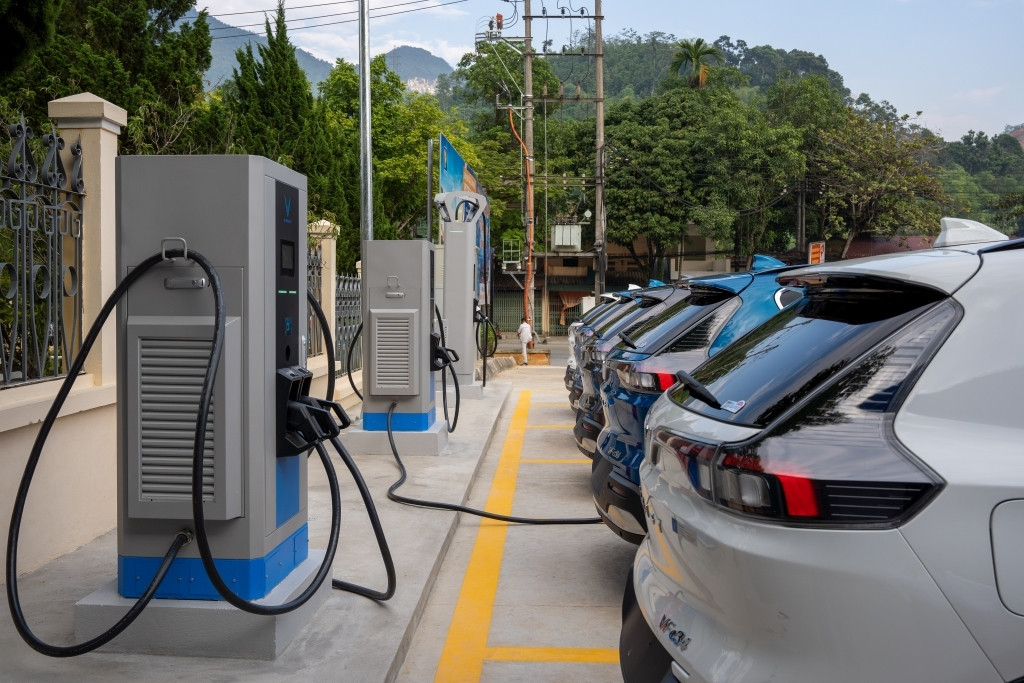
A recent proposal to mandate electric vehicle (EV) charging station sharing among companies has stirred sharp backlash from experts, who argue it’s unreasonable and threatens both business rights and the broader Vietnamese auto industry - especially as foreign firms look to profit without investing in infrastructure.
A confusing, anti-market proposal
At the roundtable “Developing Green Vehicles in Vietnam: Toward Net Zero” held on March 27, Dr. Tran Huu Minh, Chief of the Office of the National Traffic Safety Committee, suggested that EV companies should be required to share their charging stations, calling it a way to “optimize resources.”
However, his proposal was immediately met with resistance from experts. Writing on his personal page, Nguyen Manh Thang, CEO of WhatcarVN, pointed out that Vietnamese companies like VinFast have invested heavily in charging infrastructure without any government support - turning this investment into a key competitive advantage to make up for their late start in EV manufacturing.
“So why should they be forced to share this advantage with competitors? That would be like shooting themselves in the foot,” Thang said.
He added that even global EV leaders like Tesla have been reluctant to share their charging networks. Tesla, for example, declined to open its stations in Europe, citing the massive costs involved in building them.
From an economic standpoint, expert Dinh The Hien noted that if a state-owned enterprise had built charging infrastructure with significant government backing, then the idea of sharing could be considered. But in VinFast’s case, the company has spent billions of its own dollars to develop this network, and forcing it to share would be unjustified government overreach.
“If foreign carmakers see profits here, nothing stops them from investing. But if they prefer to rely on existing infrastructure without spending, that’s unfair competition. In the end, foreign brands benefit, while Vietnamese companies lose the edge they’ve worked hard to build,” Hien emphasized.
Who loses when foreign EV brands exploit infrastructure?
Assoc. Prof. Dr. Dam Hoang Phuc, Director of the Automotive Engineering Program at Hanoi University of Science and Technology, also opposed the proposal, stating clearly that charging stations are not public welfare - they are a business sector.
“If it’s a business, it can’t be subject to administrative mandates that override market principles,” he said.
He warned that flawed policy could turn EV charging into a “scramble” for foreign firms looking to exploit available infrastructure without contributing to its long-term development.
“These companies might enter the Vietnamese market, take advantage of the infrastructure, make profits, then leave - leaving domestic consumers to deal with the fallout,” Phuc explained.
Echoing that concern, economist Dinh The Hien added that while Vietnam must welcome diverse players in the EV space, this should not come at the expense of local auto industry growth - or the national economy as a whole.
Assoc. Prof. Dr. Dam Hoang Phuc emphasized that if Vietnam’s EV market is to develop sustainably, the government should incentivize businesses to build charging stations - not force domestic companies to share them.
“Any company wanting to sell EVs in Vietnam must take responsibility for investing in infrastructure. They can’t just show up to sell cars and rely on what others have built. Without binding rules, we’ll see companies that only care about sales, not long-term investment - ultimately hurting consumers,” he warned.
Hong Minh